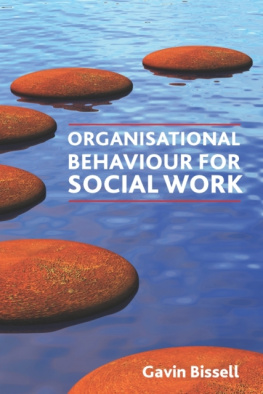Promoting Individual and Organisational Learning in Social Work
Promoting Individual and Organisational Learning in Social Work
Learning Matters
An imprint of SAGE Publications Ltd
1 Olivers Yard
55 City Road
London EC1Y 1SP
SAGE Publications Inc.
2455 Teller Road
Thousand Oaks, California 91320
SAGE Publications India Pvt Ltd
B 1/I 1 Mohan Cooperative Industrial Area
Mathura Road
New Delhi 110 044
SAGE Publications Asia-Pacific Pte Ltd
3 Church Street
#10-04 Samsung Hub
Singapore 049483
Editor: Luke Block
Development editor: Lauren Simpson
Production controller: Chris Marke
Project management: Swales & Willis Ltd, Exeter, Devon
Marketing manager: Tamara Navaratnam
Cover design: Wendy Scott
Typeset by: Swales & Willis Ltd, Exeter, Devon
Printed by: MPG Books Group, Bodmin, Cornwall
2012 Sarah Williams, Lynne Rutter, Ivan Gray
First published 2012
Apart from any fair dealing for the purposes of research or private study, or criticism or review, as permitted under the Copyright, Design and Patents Act, 1988, this publication may be reproduced, stored or transmitted in any form, or by any means, only with the prior permission in writing of the publishers, or in the case of reprographic reproduction, in accordance with the terms of licences issued by the Copyright Licensing Agency. Enquiries concerning reproduction outside these terms should be sent to the publishers.
Library of Congress Control Number: 2012945180
British Library Cataloguing in Publication Data
A catalogue record for this book is available from the British Library
ISBN 9781446266908
ISBN 9781446266915 (pbk)
Contents
List of illustrations and activities
Figures
Tables
Activities
About the authors
Sarah Williams has been employed in senior and middle management positions in a range of statutory, voluntary and independent sector organisations. She has a particular interest in the development of professional capability through work-based learning and has 18 years experience as a practice educator and 12 years experience as a senior lecturer. Sarah currently works at Bournemouth University, where she is the co-ordinator of the Practice Educator Programme and also a contributor to leadership and management education. She is co-author of the Learning Matters text The Practice Educators Handbook.
Lynne Rutter holds academic and professional qualifications in education and has several years experience of developing and delivering Bournemouth University programmes. Her doctorate research focused on the development of professional knowledge and she is a coauthor of the Learning Matters texts Critical Thinking and Professional Judgement for Social Work and The Practice Educators Handbook. Currently she is developing continuing professional development units for post-qualifying social work.
Ivan Gray holds academic and professional qualifications in social work and management and specialises in management development. Before his retirement in 2012 he was programme leader for the BA in Health and Social Care Management and MA in Leading and Developing Services at Bournemouth University.
Foreword
In todays performance driven and managerialist environment, maintaining service quality in social work is more important than ever. This book is intended to help managers and social workers understand the fundamental role that professional and organisational learning plays in the provision of services that are effective and responsive to the needs of service users, carers and the communities in which they live. Recent national policy drivers such as the Munro report (2011) and the recommendations of the Social Work Reform Board (2010) strengthen the importance of embedding and enabling learning within the workplace and, although professional learning is the responsibility of all employees, managers have a special role to play.
This book will help managers to explore how they can fulfil this role at both a strategic and operational level. In response to the Munro report (2011), the government has called for a change in the way that social services are delivered. At the heart of these changes is an understanding that risk cannot be eliminated and an expectation that front-line practitioners will be given more freedom to exercise their professional judgement. If such changes are to be made, managers will need to have the skills and confidence to create a climate in which critical reflection on practice is encouraged and supported, and where a commitment to continuous learning and improvement is the norm. This text provides opportunities for managers to consider ways in which they can foster and develop learning at an individual, group and organisational level, allowing practitioners to commit to maximise the effectiveness of their practice which, in turn, enhances the quality of the service.
The primary aims of this book are to:
- help managers to respond to the key recommendations of the Social Work Reform Board (2010) and the Munro report (2011) with regard to learning and development;
- focus on the essential need for leading and enabling continued learning and professional development for maintaining/improving service quality;
- identify and explore the use of learning cultures and partnership approaches for leading and enabling such learning.
As with all the post-qualifying social work texts, this book is written and designed to ensure that the very best social work practice is delivered within our society and, with this aim in mind, I highly commend this text to you.
Professor Keith Brown
Series Editor
Director of the Centre for Post Qualifying Social Work,
Bournemouth University
Introduction
As we are writing this book the social work profession is facing one of the most significant shake-ups in its history. Following a decline in public and government confidence, the Social Work Reform Board (SWRB) was established in 2010 to look at how social workers and the agencies that employed them could respond to the recommendations of the Social Work Task Force (SWTF, 2009) and make their services fit for purpose in the twenty-first century. Work is now in progress to turn the recommendations into practical solutions that will enable social workers to deliver cost-effective and responsive services that safeguard and support the most vulnerable members of our society.
In essence, the SWRB has developed recommendations to establish a Professional Capabilities Framework (PCF), employer standards and a framework for continuing professional development. A new College of Social Work is now fully responsible for the PCF, introduced in 2012 as the single way in which social workers should think about and plan their careers and professional development. The College says the PCF is a living document, in that it is likely to develop as the profession develops, serving as a backdrop to both initial social work education (an assessed and supported year in employment or ASYE), and continuing professional development after qualification.
At the heart of the reform agenda is the recognition that social workers practise in uncertain and complex situations in which risk can never be completely eliminated. Both the SWRB and the more recently published Munro report (2011) stress the importance of moving away from top-down, target-driven management towards a more creative and flexible approach to service provision that enables social workers to learn from their experiences and have more freedom to exercise their professional judgement.




